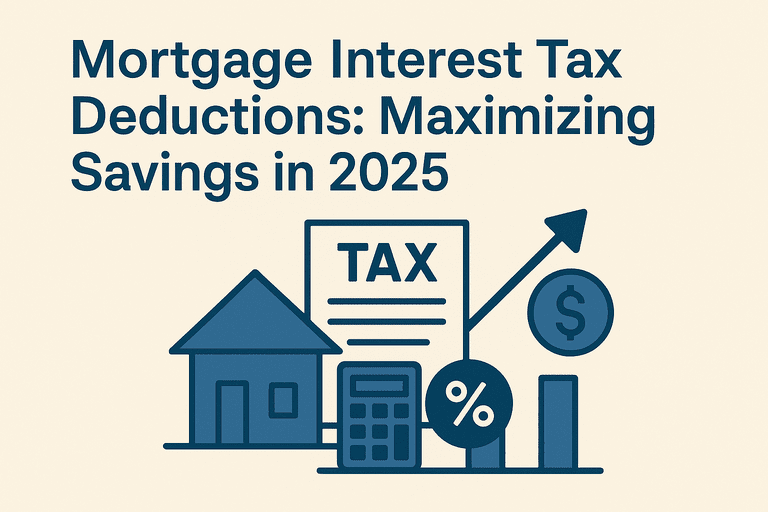For many homeowners, the mortgage tax deduction remains one of the most valuable financial benefits of owning a home. By allowing you to deduct interest paid on your mortgage, this deduction—also known as the home interest deduction—can significantly reduce your taxable income. As we head into 2025, tax laws and eligibility requirements continue to evolve, making it important to understand how to maximize these tax benefits of homeownership.
In this guide, we’ll break down the rules, provide actionable strategies, and help you uncover ways to fully leverage your deductions for the year ahead.
Understanding the Mortgage Tax Deduction in 2025
The mortgage tax deduction lets homeowners deduct interest on mortgage debt used to buy, build, or substantially improve their primary or secondary residence. For 2025, the standard deduction remains high, which means itemizing your taxes to claim the home interest deduction may only make sense if your total itemized deductions exceed the standard deduction.
Key IRS Limits for 2025
You can deduct interest on up to $750,000 of mortgage debt (or $375,000 if married filing separately) for loans taken after December 15, 2017.
For older mortgages (before the cutoff date), the limit remains $1 million.
Home equity loans and HELOC interest are deductible only if the funds are used for home improvements.
Home Interest Deduction vs. Standard Deduction
Before claiming the home interest deduction, you should compare it with the standard deduction. The IRS standard deduction for 2025 is:
$14,850 for single filers
$29,700 for married couples filing jointly
$22,400 for heads of household
If your mortgage interest, plus other deductions such as property taxes and charitable contributions, doesn’t exceed these amounts, you may not benefit from itemizing.
Additional Tax Benefits of Homeownership
Beyond the mortgage interest deduction, homeowners may qualify for other tax benefits, including:
Property Tax Deduction: Deduct up to $10,000 ($5,000 if married filing separately) in state and local property taxes.
Energy Efficiency Credits: Tax credits for installing solar panels, energy-efficient windows, or insulation.
Capital Gains Exclusion: Exclude up to $250,000 ($500,000 for married couples) of profit when selling your home, if you meet residency requirements.
Strategies to Maximize Your Mortgage Tax Deduction in 2025
1. Time Your Mortgage Payments
If possible, make your January 2026 mortgage payment in late December 2025 to claim an extra month’s worth of interest on this year’s return.
2. Leverage Home Equity for Improvements
If you’re planning a remodel, using a HELOC or home equity loan for qualified improvements ensures the interest is deductible.
3. Combine Deductions for Itemizing
Bundle deductible expenses, such as charitable donations, medical expenses, and property taxes, into the same tax year to exceed the standard deduction threshold.
4. Keep Detailed Records
Retain Form 1098 from your lender, as well as receipts for any home improvements made with loan funds.
Common Mistakes to Avoid
Deducting Non-Qualifying Loans: Interest on loans used for personal expenses (like vacations or cars) isn’t deductible, even if secured by your home.
Forgetting to Itemize: If you take the standard deduction, you can’t also claim the mortgage interest deduction.
Not Checking Refinancing Rules: Refinanced mortgage interest is deductible, but limits may apply based on the original loan amount.
When to Consult a Tax Professional
Because tax laws are complex and frequently updated, consulting a qualified tax advisor can help you maximize your savings and avoid costly errors. They can analyze your individual financial situation to determine whether the mortgage tax deduction offers real benefits compared to the standard deduction.
Final Thoughts
The mortgage tax deduction remains a powerful tool for reducing your tax bill in 2025, but it requires careful planning. By understanding eligibility rules, comparing itemizing versus the standard deduction, and strategically timing your payments, you can ensure you’re making the most of your home interest deduction and other tax benefits of homeownership.
If you want to see how much you could save, try the free tax savings calculator at CalculatingAmortgageLoan.com and start planning your 2025 deductions today.
Sources:
